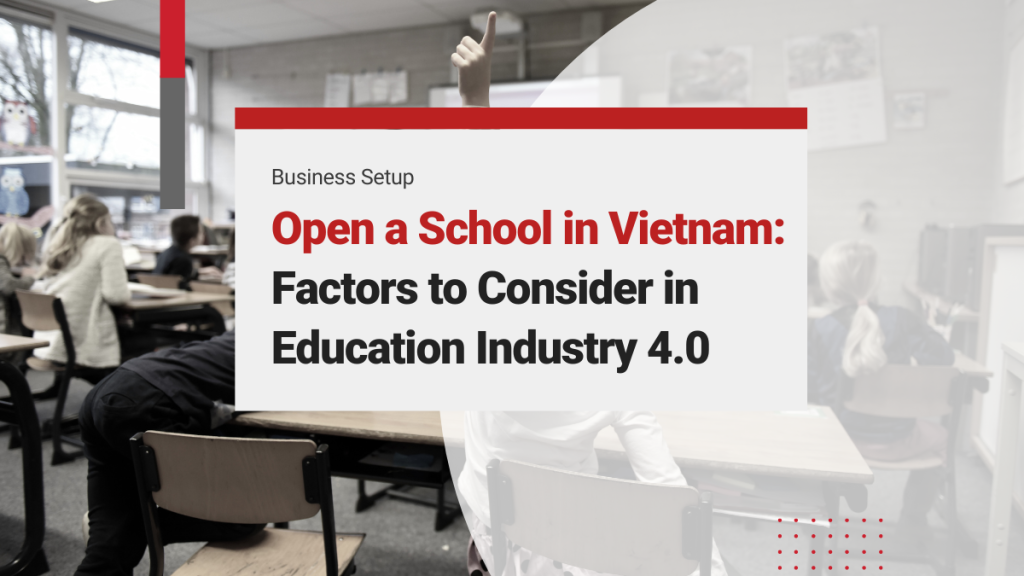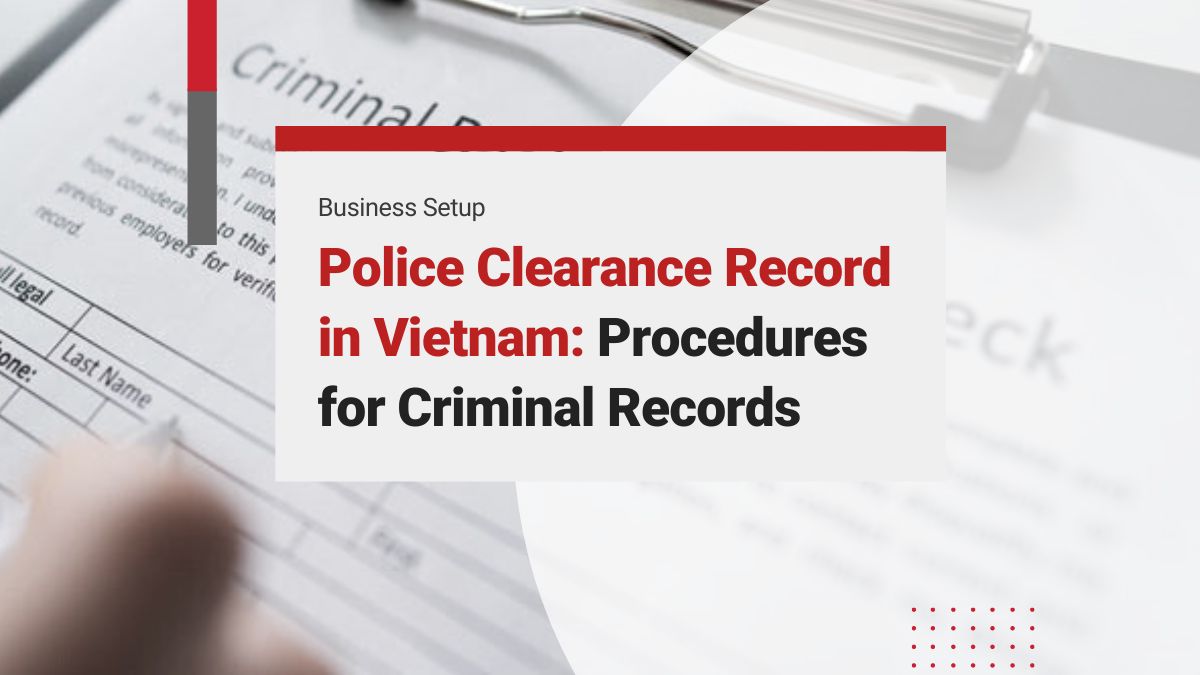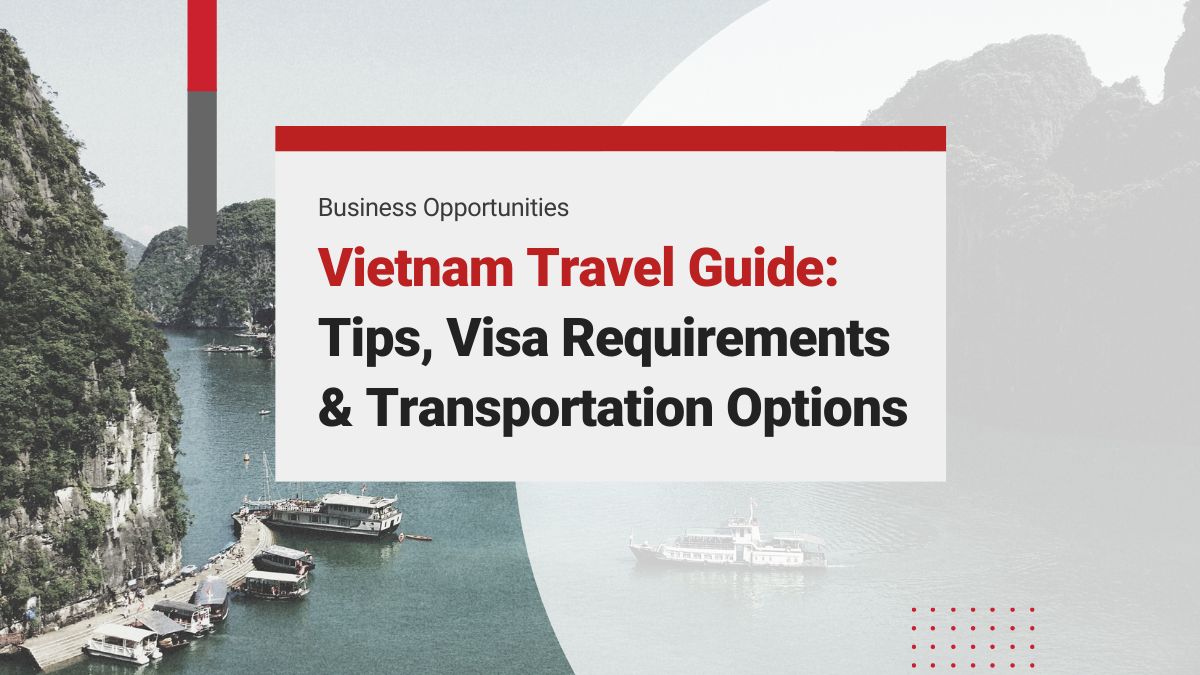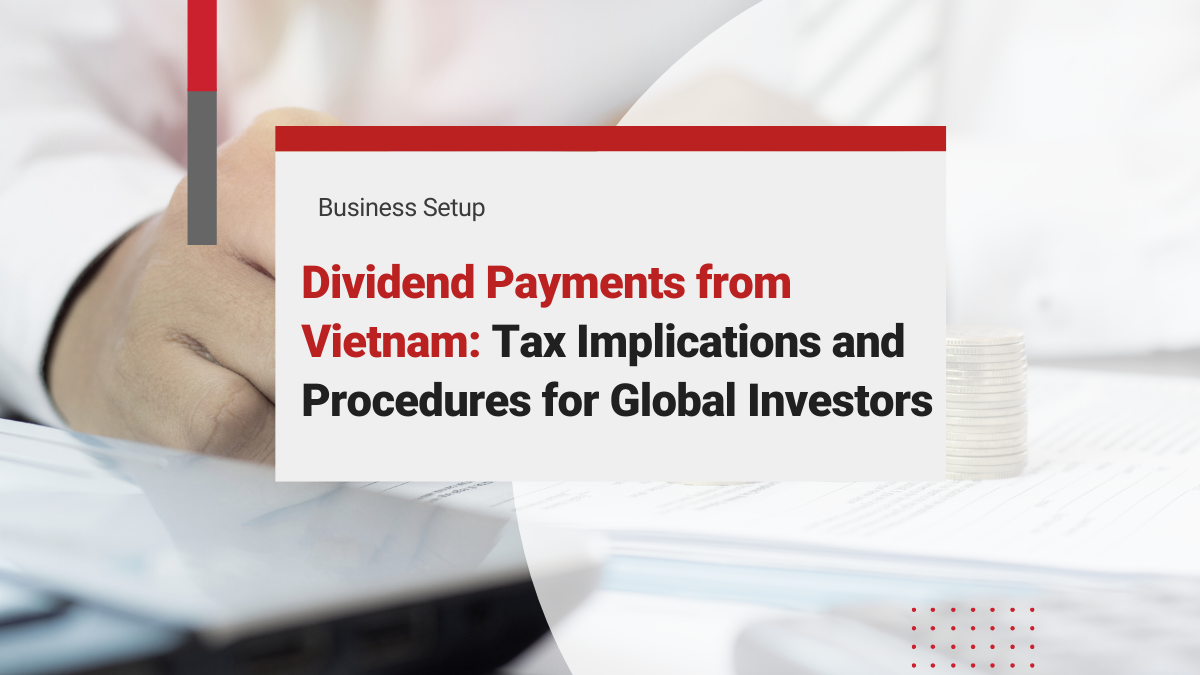The rise in overseas investment coupled with the growing number of people entering the middle class in Vietnam has made the Education Industry a thriving sector for business opportunities. As per the World Data Lab, the Vietnamese middle class is slated to expand by 60% by the end of 2030 and school infrastructure is a crucial part of their life. The same holds true for international students as foreign companies set up business here, making many overseas people migrate to Vietnam for work.
In the last 10 years leading up to 2020, spending on the education sector in Vietnam has increased exponentially, says the Vietnam National Institute of Educational Science (VNIES) because of a 2018 decree which allowed foreign investment. In 2021, an estimated VND 249.5 trillion was spent on education and training which was 4% of the GDP.
So, if you are looking to open a school in Vietnam, there is ample scope and support. In this article, we will guide you through the factors that make the Education Industry 4.0 a lucrative sector to start a business in a country with the world’s 18th largest middle-income class projected to reach 21 million by 2030.
Interested in Opening a School in Vietnam? Check out InCorp Vietnam’s Incorporation Services in Vietnam
Education Industry: Definitions and Segments
To understand how the Education Industry 4.0 is flourishing in Vietnam, it is important to get an overview of the sector and its different segments.
Overview of the Education Industry
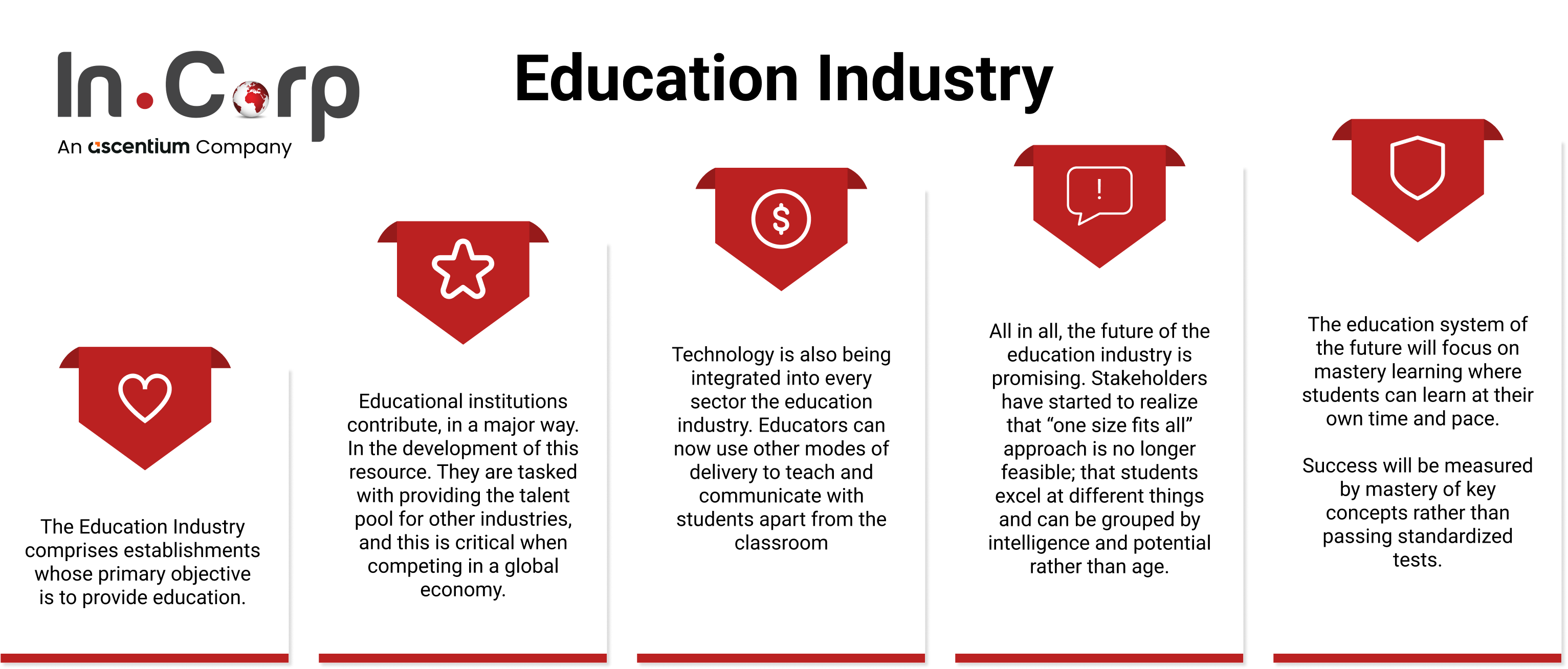
The education system of all countries is made up of public, for-profit and non-profit entities whose main agenda is to provide education. Hence, it includes kindergartens, primary schools, secondary schools, community colleges, universities and also vocational centers that help people upskill with technical training.
The ministries or departments of education like the Department of Education and Training of HCMC play a major role in improving the education standard of the country by providing adequate school infrastructure.
Other than these, educational institutions like online academies, educational support services, vocational centres and charter schools help to improve the education standard with technical courses and industry-specific skill developments. While kindergarten or elementary school deals with toddlers and small children, primary schools and secondary schools are for junior high and senior high school students, respectively. In contrast, colleges and universities are for undergraduate and postgraduate students.
All these types of educational institutions address the necessity of a skilled and talented workforce for other sectors along with the generation of revenue for the educational industry 4.0 which ultimately helps in the economic growth of the country.
Key Segments of the Education Industry
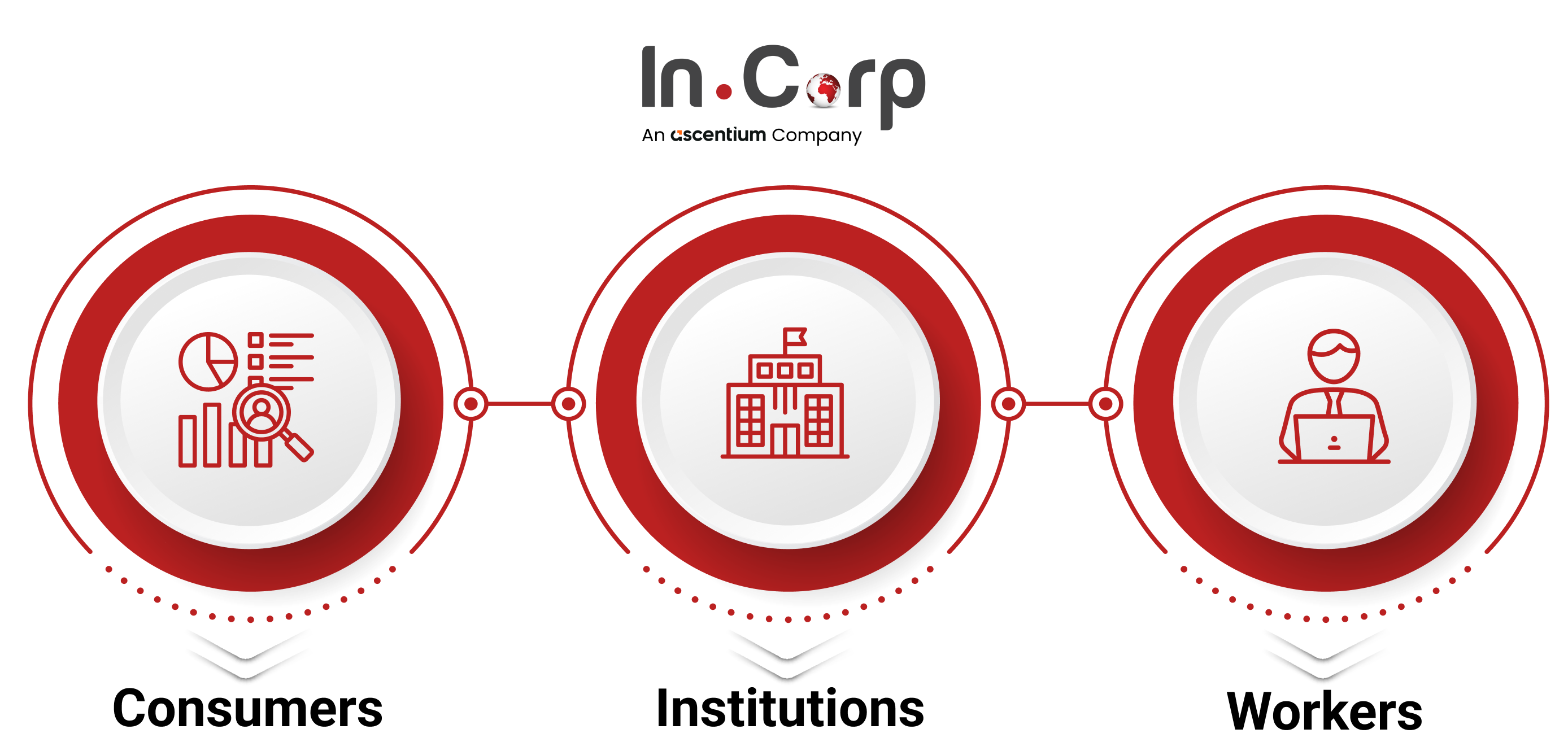
To set up a school in Vietnam or any other country, it is necessary to understand the various segments that form the basis of the education industry and how each of them fares.
- Consumers or Students: The foremost part of the education sector is students who need dedicated educators to fulfill their academic goals and learn basic skills and knowledge with the help of technology-enabled learning models. The education system in Vietnam is highly technology-driven which has resulted in better outcomes for the students and also other industries who depend on skilled labor coming out of the education sector.
- Workers or Educational professionals: The primary workforce of the industry are the teachers, professors, lecturers, counsellors, sports coaches, administrators, librarians and other educational professionals who help the students to achieve their goals Even textbook publishers and assessment providers form a key part of this workforce. The burden of improving the education standard lies on these people’s shoulders as they ensure the students are using all the available resources to their full potential, maintaining operational efficiency in the education system.
- Institutions: Last but not least are the edifices that harbor the educational institutions which form the backbone of the education industry of any country. This includes the various private and public schools, colleges and universities along with the vocational education centers which impart the necessary skills to the newly graduated students to make them employable or get at least an internship opportunity.
This segment also includes educational content suppliers and supporting education services like online academies, charter schools, special schools, etc. These institutions are tasked with improving the educational or school infrastructure by using financial resources and student data available to them. Next to the Department of Education and Training of HCMC, these educational institutions are responsible for operations management in the education sector.
Overview of Vietnam’s Education Industry
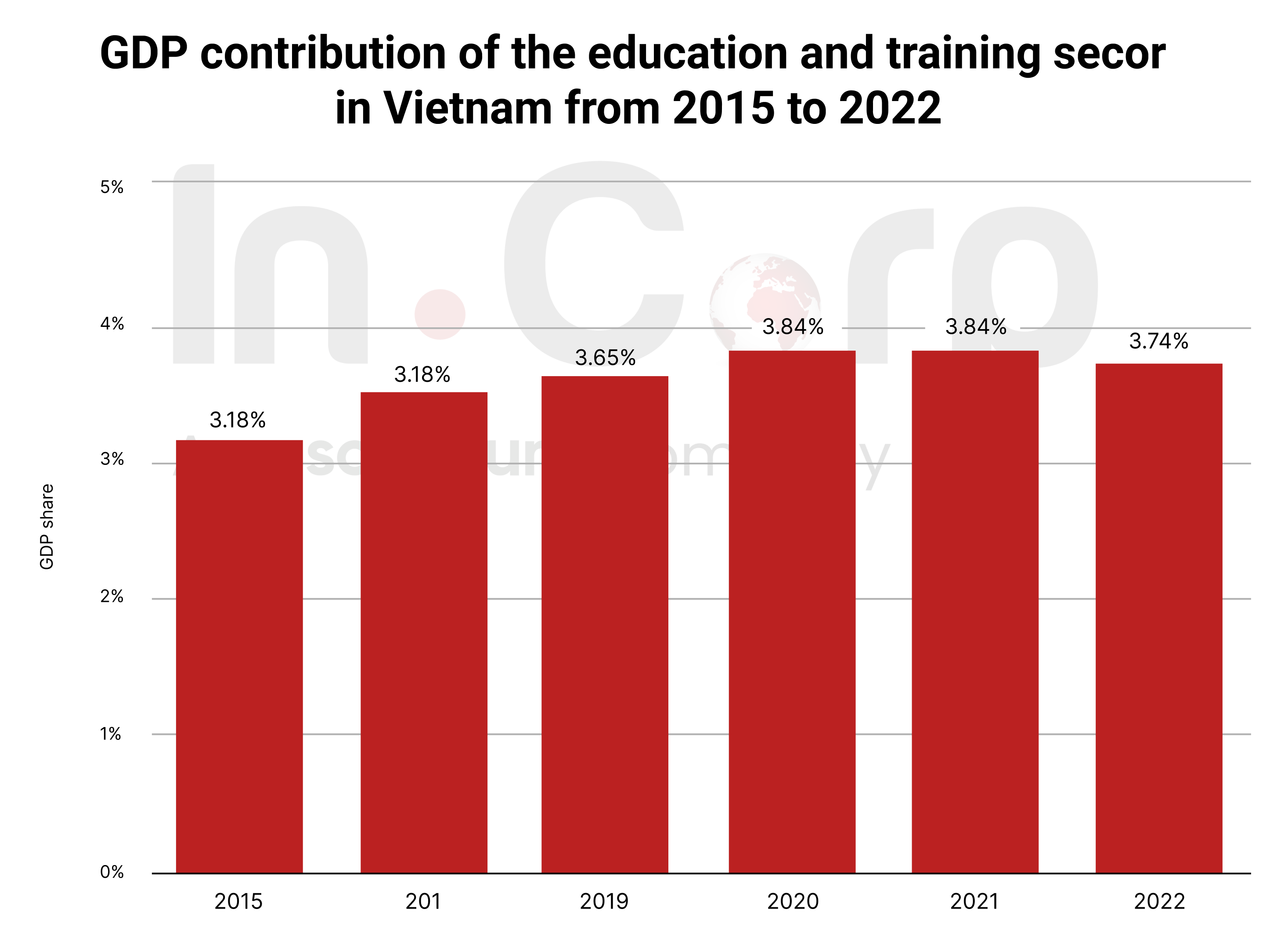
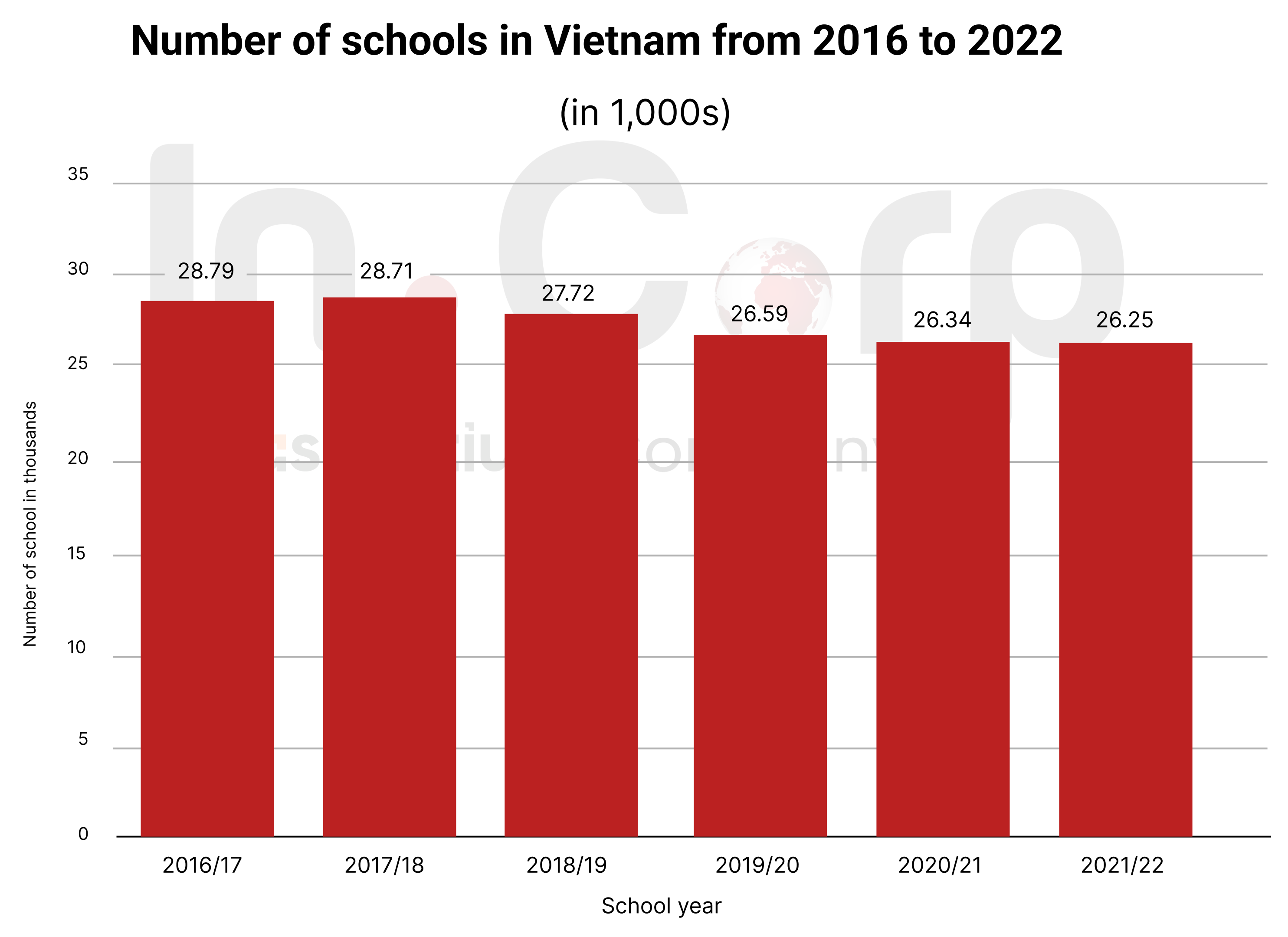
Usually, school-level learning in Vietnam is divided into 3 phases – primary school (from age 6 to 11), lower secondary school and upper secondary school. This culminates into 12 years of learning from age 6 to 18 years of age when they enter colleges and subsequently go to universities.
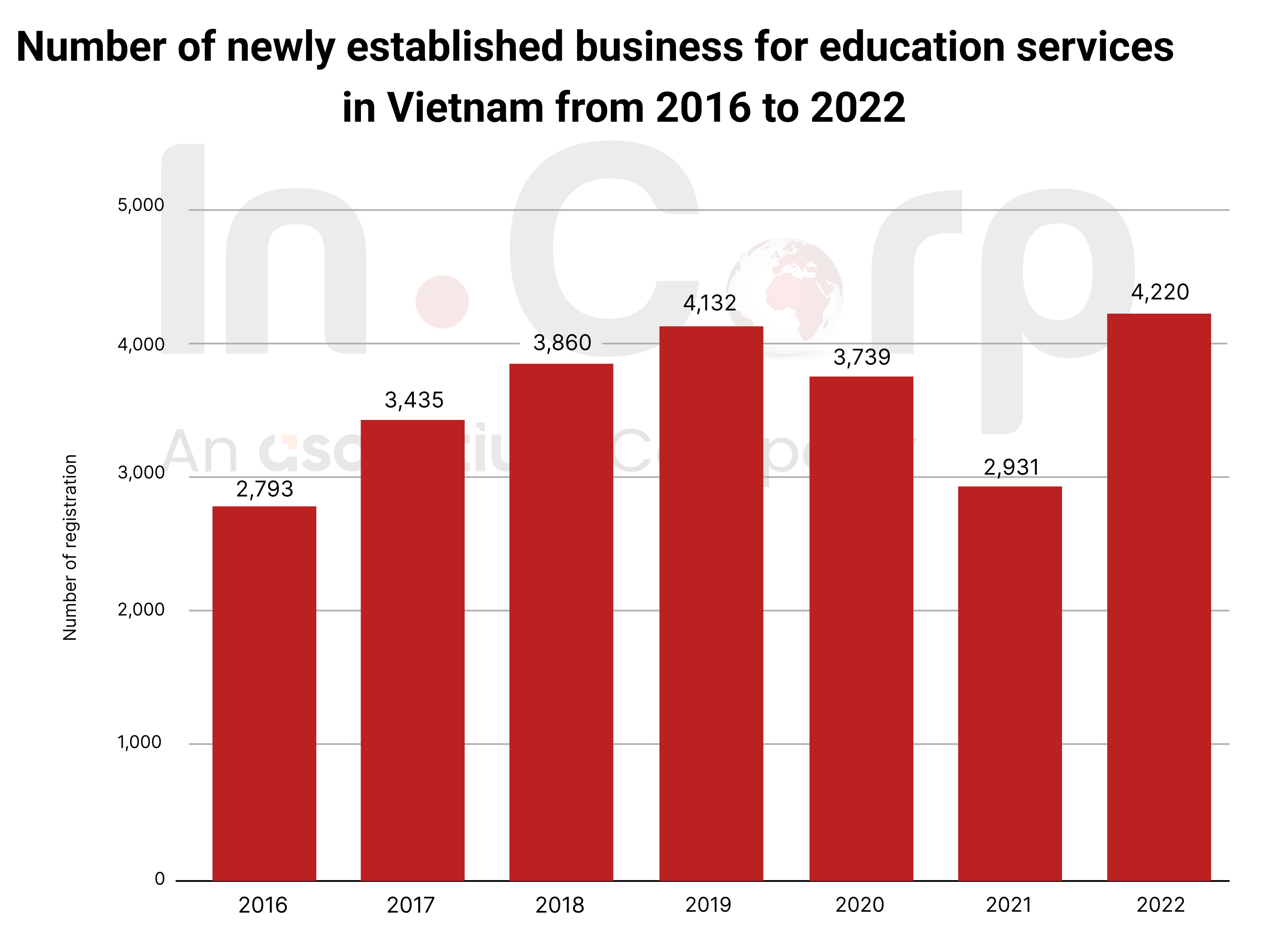
According to a Statista report, there were 4220 newly registered educational businesses in Vietnam in 2022, up from 2931 in the previous year, indicating the business prospects of the education industry in the country. The overall number of schools in 2021 – 2022 was 26.25 thousand, down from 26.34 thousand in 2020 – 2021 and 26.59 thousand in 2019 – 2020 which could be attributed to the COVID-19 slowdown.
The same report further highlighted how schools were faring in Vietnam as seen in 12.5 thousand primary schools with 288.5 thousand classrooms and 382.5 thousand teachers at the start of the September 2021 academic year. In 2022, there were 24.1 pupils for every teacher and most of the primary teachers were female. In 2020, 78.6% of these teachers in Vietnam were women.
Further analysis of the Statista report revealed the extent of growth in the education industry of Vietnam as it accounted for 3.74% of the GDP in 2022, roughly pumping VND 355 trillion into the economy, compared to the total GDP of VND 9.5 thousand trillion that year. The report also sheds light on the monthly gross salary of workers in the education sector in 2019 which stood at VND 6 million for entry-level jobs and VND 8 million for experienced people. While managers got VND 20 million in gross monthly salary in 2019, leaders and supervisors got a mere VND 13 million.
All these statistics prove that the education industry in Vietnam is growing as shown in the 437 foreign-funded projects it received in 2020 which boosted the sector with US$4.3 billion in revenue. The majority of it went into language studies like English. As of 2020, 450 English language facilities were there in Ho Chi Minh City and Hanoi City. This is likely to grow in the upcoming years as edtech and distance learning have become the norm in Southeast Asia and Vietnam has huge potential in the area, says the International Trade Admission.
Now if you are thinking of starting a school in Vietnam, you can set up Montessori schools like Montessori International School (MIS) in Ho Chi Minh City for 18 months to 12-years-old, schools for K-12 education for 6-18 years-old or invest in higher education ventures which has huge potential because most Vietnamese spend US$2 billion annually to study abroad. Just remember when schools will open in Vietnam (usually September) and plan your venture accordingly.
Read Related: 9 Reasons to Choose Ho Chi Minh City in Vietnam to Launch Your Business
Key Trends in Education Industry 4.0
To open a school in Vietnam you must be aware of the ongoing trends in the education industry to make a mark and attract the workforce (teachers) as well as the consumers (students). Knowing this will help you make the biggest impact possible and also ensure substantial revenue generation. Here are the trends you must keep in mind:
- Edtech tools are in demand as the market is forecasted to grow at 16% CAGR between 2022 and 2026. This surge is seen in all stages of the education sector like PreK, K12, post-secondary and even in corporate workforce training. In 2021, the K-12 stage had 50% of the edtech market share but with the development of AI-enabled learning tools, interactive whiteboards, virtual reality and game-based learning tools it is slated to capture other segments as well. However, data privacy and cyber fraud concerns can hinder the uptick of this market.
- Open-source textbooks remain the first point of reference for educationists and students, especially in the higher education sector as they need to access a large number of academic literature from different sources which are mostly highly-priced. Hence textbook rental platforms or open-access textbook providers like Chegg, Internet Archive, Spark Notes etc are becoming increasingly relevant, especially in this digital age.
- Online academies have become a preferred choice for students across the education industry, especially those in the K-12 and higher education segment as the interactive classrooms, live-streaming and video-conferencing features have opened up dynamic opportunities for learning from experts across the world. It also supports the learning ability of every student as they can get customized solutions sitting at home. Some of these academies are even providing online courses to foreign students, generating substantial revenue.
- Digital upskilling has become the key to success as more and more employers are looking for people with AI, coding, machine learning, cloud computing, data science, cybersecurity and other such skills. While the global online data science training programs market is growing at 25.1% CAGR in 2022-26, the global coding bootcamp market is experiencing a 19.3% CAGR growth in the same period.
- The e-learning market is accelerating at an exponential rate globally since the pandemic. The global e-learning market is growing at 9.1% CAGR and is estimated to be worth US$686.9 billion by 2030. In 2022, it was worth US$332.6 billion.
Key Factors for Starting a School in Vietnam: Operations Management Education
As you gear up to answer the ‘When will schools open in Vietnam?’ question and establish a school in the country, you must know the basics of operations management education. Knowing the key factors that regulate an educational establishment is essential to making an impact in the education industry
Licensing, Accreditation, and Curriculum
For foreign entrepreneurs looking to invest in the education sector of Vietnam, opening a school is equivalent to setting up a business which has to go through legal formalities. This includes getting the following licenses with the help of agencies or on your own.
- Investment Registration Certificate (IRC): Similar to any other business, opening a school also requires an IRC from the Department of Planning and Investment (DPI) but it has to be backed by the respective education departments and ministries. While K12 and other educational establishments need Department of Education and Training approval only, colleges and universities need approval from the Prime Minister and ministries governing the respective fields.
- Enterprise Registration Certificate (ERC): The ERC granted by the Department of Planning and Investment acknowledges the legal entity of your enterprise or school.
- School Establishment Permit: This ensures that you are legally allowed to set up an educational institute in Vietnam. While most schools get approval from the Department of Education and Training along with a nod from the local People’s Committee Chairman, higher education institutions require approval from the Ministry of Education and Training (MoET) and the PM.
- Education Operation Permit: To successfully operate a school an Education Operation Permit is needed which is issued by MoET in the case of colleges and universities while institutions without higher education get it from the Director of the Department of Education and Training.
- Franchise Approval: In case you are setting up an educational establishment which is part of an international franchise, you need franchise approval from the Ministry of Industry and Trade (MoIT).
- Other permits and licenses: You might also require work permits and visas to hire educational professionals like teachers, professors, administrators, librarians etc. Land ownership permits, rental agreements, funding and investment proof are also needed to establish the institute. If the school has boarding services then you need to submit some paperwork to the local police department.
Additionally, MoET will also investigate if the school meets the standards set by the curriculum authority it follows like the US, UK or International Baccalaureate (IB) framework.
Educational institutions can opt for external accreditation to ensure its quality. The accreditations recognized by Vietnam include:
- WASC, CIS or other international accreditation
- Oxford, Cambridge, Edexcel or other such curriculum accreditation
- An overseas school brand accreditation which is a partner to the institution
- Local Education Ministry License which is mandatory
Legal Entity Options and Capital Investment
Foreign investors who are entering the education industry in Vietnam by setting up a school should consider certain legal entity options with the corresponding capital investment that suits them. This includes:
- Branch office or foreign subsidiary
- A limited liability company which has a minimum of one shareholder with no capital required
- A 100% foreign-owned company
- A partnership with a local company which has a minimum of two shareholders.
Read More: Doing Business in Vietnam: Role of Investors in Business and 4 Types of Business Models
You can fulfil your needs through the following legal entities:
- By forming partnerships with local enterprises like foreign educational professionals tying up with real estate developers, allowing the foreign company to focus on educational operations and workforce while the partner takes care of the school infrastructure and licensing.
- By cross-border franchising with international educational brands who want to expand their footprint in Vietnam
- By sole ownership for people with strong educational and capital expertise to indulge in this high-risk investment.
The basic capital investment required for schools in Vietnam stands at VND 1 trillion for higher education institutes, VND 50 billion for secondary schools and VND 20 million for a 1000-student vocational education center.
Read More: An Extensive Guide to Industry Capital & Deposit Requirements in Vietnam
Regulations on Infrastructure
The school infrastructure of your establishment should follow the regulations and have certain facilities. . If you are opening a K-12 school, then the following requirements must be fulfilled:
- Specific offices and meeting rooms for teachers and the board of directors
- Teaching and learning equipment as per MoET standards
- Library as per MoET standards
- Subject-specific classrooms in secondary and high schools
- Computer labs, support rooms for the disabled, canteens, clinics, break rooms, art rooms and multifunctional gyms
- Location of institute accessible to students
- Sufficient area in the school for activities (6sqm/student in urban areas, 10sqm/student in rural areas
- 2.5 sqm/student teaching area in school
- 30% of the school area is allocated to parking lots, training grounds and playgrounds including gates and walls
- Drainage systems, bathrooms and clean water supply as per Ministry of Education and Training standards
Strategic Planning
The most crucial factor which determines the success of your school and ensures you make a mark in the education industry 4.0 is strategic planning. To enhance operations management in the education sector, schools often draw up a 5-10-year plan where vital details like costs and expenditures are taken care of.
It’s crucial to formulate a long-term strategic plan as most schools don’t see much profit 4 years from the start of the operation. Hence, laying out a detailed short-term and long-term financial plan is essential for the smooth running of the establishment, keeping in view that most financial goals will be achieved between 3rd and 5th year of operation.
Investment in Vietnam Education Industry: Opportunities and Challenges
While bribing affects admission to schools, passing tests and high grades of students, high taxes and low foreign capital investment can affect partnerships and workforce hiring. The regulatory process can also pose a hurdle for investors trying to make an entry into the education sector.
Similar to most south-east Asian countries here too students tend to opt for training programs and private classes to enhance their performance and skills. Also, most Vietnamese students are highly aspirational and want to indulge in higher education, unlike their global counterparts.
Out of all the cities in Vietnam, only 27 cities including Ho Chi Minh City have the most number of international schools which is over 50. These schools act as a seat of learning not just for expatriate students but also for local students who want international credentials. However, restrictions on domestic students prevent them from attending international schools.
Set of Regulations for Investment in the Education Sector
Foreign investors trying to capture the education industry in Vietnam should keep in mind the following regulations:
- Decree 31/2011/ND-CP: Requires the institution to fulfil conditions like school infrastructure and government-approved contract according to the Law on Education. Also mandates the school has a group of people eligible for subsidies and helps vocational institute graduates with fees.
- Decree 70/2009/ND-CPA: Underlines which government bodies are in charge of which approvals in the vocational education segment. Hence, it helps you to navigate between the specific responsibilities of the local People’s Committees, Provincial Departments and Ministries. The key authorising bodies are the Ministry of Labour, Invalid and Social Affairs (MOLISA) and the General Department of Vocational Training (GDVT).
- Decree 73/2012ND-CP: Issued for foreign direct investments and collaboration under the 2005 Investment Law. It’s mandatory if the institute has twinning programs and for foreign-invested institutes and representative offices of foreign schools.
- Decree No. 86/2018/ND-CP: It underlines that the maximum number of Vietnamese students allowed to enroll in foreign universities is 10-50%. It also ascertains the eased procedure of international training at these institutes and allows foreign investors to participate in acquisitions and mergers.
Why Choose InCorp Vietnam as Your Business Partner?
Finding the perfect investment opportunity in the education industry can be tricky. InCorp Vietnam’s dedicated team of experts can guide you through the process, making sure you fulfil all the license requirements to set up an educational establishment in a cost-efficient manner.

clients worldwide

professional staff

incorporated entities in 10 years

compliance transactions yearly

